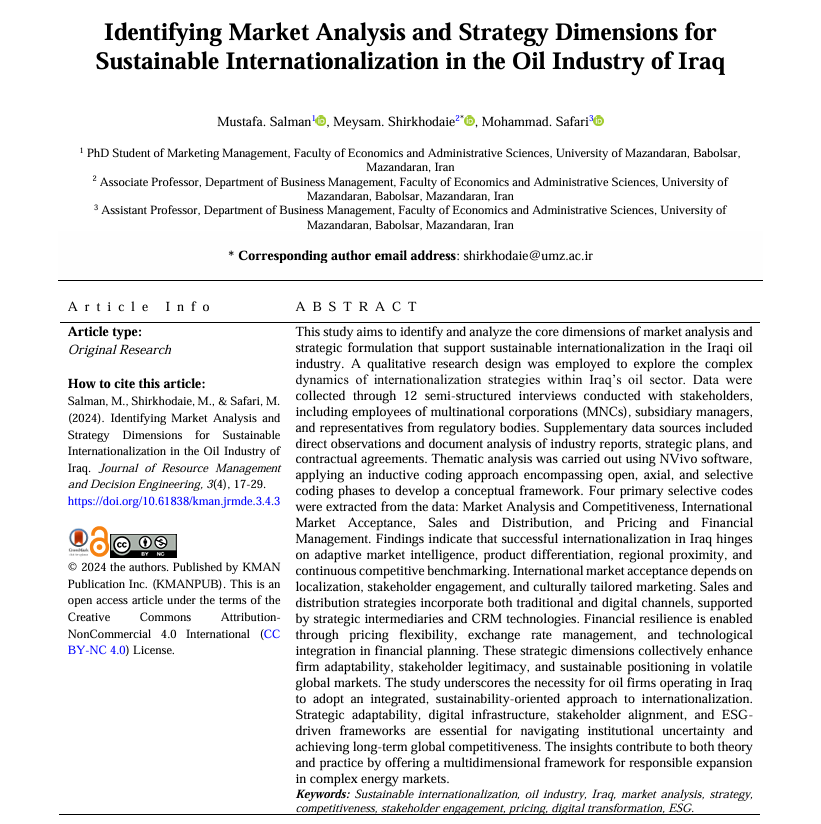Identifying Market Analysis and Strategy Dimensions for Sustainable Internationalization in the Oil Industry of Iraq
Keywords:
internationalization, sustainability, competitive advantage, strategy, oil industry, IraqAbstract
This study aims to identify and analyze the core dimensions of market analysis and strategic formulation that support sustainable internationalization in the Iraqi oil industry. A qualitative research design was employed to explore the complex dynamics of internationalization strategies within Iraq’s oil sector. Data were collected through 12 semi-structured interviews conducted with stakeholders, including employees of multinational corporations (MNCs), subsidiary managers, and representatives from regulatory bodies. Supplementary data sources included direct observations and document analysis of industry reports, strategic plans, and contractual agreements. Thematic analysis was carried out using NVivo software, applying an inductive coding approach encompassing open, axial, and selective coding phases to develop a conceptual framework. Four primary selective codes were extracted from the data: Market Analysis and Competitiveness, International Market Acceptance, Sales and Distribution, and Pricing and Financial Management. Findings indicate that successful internationalization in Iraq hinges on adaptive market intelligence, product differentiation, regional proximity, and continuous competitive benchmarking. International market acceptance depends on localization, stakeholder engagement, and culturally tailored marketing. Sales and distribution strategies incorporate both traditional and digital channels, supported by strategic intermediaries and CRM technologies. Financial resilience is enabled through pricing flexibility, exchange rate management, and technological integration in financial planning. These strategic dimensions collectively enhance firm adaptability, stakeholder legitimacy, and sustainable positioning in volatile global markets. The study underscores the necessity for oil firms operating in Iraq to adopt an integrated, sustainability-oriented approach to internationalization. Strategic adaptability, digital infrastructure, stakeholder alignment, and ESG-driven frameworks are essential for navigating institutional uncertainty and achieving long-term global competitiveness. The insights contribute to both theory and practice by offering a multidimensional framework for responsible expansion in complex energy markets.
References
Alajmi, M., Mohammadian, M., & Talukder, M. (2023). The Determinants of Smart Government Systems Adoption by Public Sector Organizations in Saudi Arabia. Heliyon, 9(10). https://doi.org/10.1016/j.heliyon.2023.e20394
Anthopoulos, L. G., & Reddick, C. G. (2023). Smart City and Smart Government: Synonymous or Complementary? 25th International Conference Companion on World Wide Web,
Chatfield, A. T., & Reddick, C. G. (2019). A Framework for Internet of Things-Enabled Smart Government: A Case of IoT Cybersecurity Policies and Use Cases in U.S. Federal Government. Government Information Quarterly, 36(2). https://doi.org/10.1016/j.giq.2018.09.007
Deandra, R. A., Nurmandi, A., & Fridayani, H. D. (2024). Implementation of Smart Government, Smart Mobility, and Smart Living Policies in Realizing the Quality of Public Services in Yogyakarta City. Jurnal Ilmu Pemerintahan Kajian Ilmu Pemerintahan Dan Politik Daerah, 9(2), 139-152. https://doi.org/10.24905/jip.9.2.2024.139-152
Ghaffari, P., Pourezzat, A. A., Araei, V., & Alvani, S. M. (2023). Designing a Model of Smart Urban Governance Using a Synthesis Approach. Journal of Public Administration, 15(3), 400-438. https://doi.org/10.22059/jipa.2023.358375.3323
Gholami, Z., Shafiei, S., & Barakhas, H. (2024). The Role of E-Government in Employee Performance at the Sports and Youth Administration of Qazvin Province With the Mediating Role of Organizational Transparency. Sports Management Studies. https://smrj.ssrc.ac.ir/article_4324.html?lang=en
Guenduez, A., Frischknecht, R., Frowein, S., & Schedler, K. (2024). Government-University Collaboration on Smart City and Smart Government Projects: What Are the Success Factors? Cities, 144. https://doi.org/10.1016/j.cities.2023.104648
Kankanhalli, A. (2019). IoT and AI for Smart Government: A Research Agenda. Government Information Quarterly, 36(2), 304-309. https://doi.org/10.1016/j.giq.2019.02.003
Popescu, M. A. M., Barbu, A., Costea-Marcu, I.-C., & Dumitriu, D. (2024). Conceptual Framework for Unified E-Government Web Platform. Proceedings of the International Conference on Business Excellence, 18(1), 3503-3514. https://doi.org/10.2478/picbe-2024-0284
Raeisi, N., Jafarinea, S., & Zare, H. (2024). Testing the Model for Enhancing Administrative Transparency in Interaction with E-Government Development Programs in the Social Security Organization. Dynamic Management and Business Analysis, 3(1), 320-334. https://doi.org/10.61838/dmbaj.3.1.18
Rahmadanita, A., Santoso, E. B., & Wasistiono, S. (2019). Implementasi Kebijakan Smart Government Dalam Rangka Mewujudkan Smart City Di Kota Bandung. Jurnal Ilmu Pemerintahan Widya Praja, 44(2), 81-106. https://doi.org/10.33701/jipwp.v44i2.279
Raza, M. A. (2024). Cyber Security and Data Privacy in the Era of E-Governance. Social Science Journal for Advanced Research, 4(1), 5-9. https://doi.org/10.54741/ssjar.4.1.2
Savić, D. (2022). Digital Transformation and the Public Sector: Smart Government for the Future. Taylor & Francis. https://www.researchgate.net/publication/368632698_Digital_Transformation_in_the_Public_Sector
Shahzad, K., Tahir, Z., Cheema, U., & Ahmad, M. A. (2024). Barriers Towards Adoption of E-Government Services. Journal of Business and Social Review in Emerging Economies, 10(2). https://doi.org/10.26710/jbsee.v10i2.2966
Shakouri-Moghadam, M. (2018). On the Configuration of Smart Government for Good Governance. Tehran: Simak. https://nahang.ir/book/721804/
Shan, S., Duan, X., Zhang, Y., Zhang, T., & Hui Li, T. (2021). Research on Collaborative Governance of Smart Government Based on Blockchain Technology: An Evolutionary Approach. Discrete Dynamics in Nature and Society, 2021. https://doi.org/10.1155/2021/6634386
Sharifian, D. (2018). Organizational Management in the Age of Information and Knowledge: The Necessity of Achieving Smart Government. Tehran: Aroon. https://arvannashr.ir/product/
Sharifian, D., Bab Al-Hawaeji, F., & Abazari, Z. (2021). Presenting a Model of Digital Identity in Smart Government in Iran's Public Sector with the Mediating Role of Digital Transformation Leadership. Knowledge Studies Quarterly, 14(52), 31-51. http://ensani.ir/fa/article/532522/
Wirtz, B. J., Weyerer, C., & Schichtel, F. (2019). An Integrative Public IoT Framework for Smart Government. Government Information Quarterly, 36(2), 333-345. https://doi.org/10.1016/j.giq.2018.07.001
Yazdani, A., & Darbani, S. (2022). The Impact of Cloud Technology on Strategic Management and Organizational Flexibility. Journal of Technology in Entrepreneurship and Strategic Management, 1(1), 12-20. https://www.journaltesm.com/article_192386.html
Zhang, J., & Mora, L. (2023). Nothing But Symbolic: Chinese New Authoritarianism, Smart Government, and the Challenge of Multi-Level Governance. Government Information Quarterly, 40. https://doi.org/10.1016/j.giq.2023.101880

Downloads
Published
Submitted
Revised
Accepted
Issue
Section
License
Copyright (c) 2024 Mustafa Salman (Author); Meysam Shirkhodaie; Mohammad Safari (Author)

This work is licensed under a Creative Commons Attribution-NonCommercial 4.0 International License.









